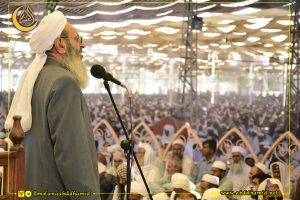Emphasizing on adhering to divine covenants, the most prominent Iranian Sunni scholar considered monotheism, performing of prayers\ Salah, paying zakah, and kinship as the most effective worships in practicing the religion of Islam.
Shaikh Abdol-Hamid was talking to tens of thousands of worshipers in Zahedan’s biggest Friday gathering on Sep. 16, 2022.
After reciting the verse 83 of chapter Al-Baqarah, the Friday Khateeb of Sunnis in Zahedan said: “In this verse, Almighty Allah has reminded us of the treaty He took from the Children of Israel. In order to achieve eternal happiness, Allah reminds us of this important pivot of Islam so that we practice all divine commandments in our lives.”
“Monotheism plays a key role in this covenant; in fact, monotheism is the greatest privilege of Muslims that separates them from non-Muslims. Almighty Allah does not have any partner in His essence, nor in His attributes. God’s attributes are so great that no one can have a share with Him,” said the president of Darululoom Zahedan.
“As Muslims, we must be sensitive to our beliefs. Sometimes a person thinks that he is worshiping Allah while he associates others with Him. Polytheism draws people to wrong and false ways, while monotheism is the way to eternal success. Therefore, we should be careful to do every good deed and every worship only for the sake of Allah’s pleasure,” he said.
Mawlana Abdol-Hamid continued his Friday sermons of Zahedan: “After monotheism, Islam insists on the rights of human beings, especially on the rights of parents, close relatives, neighbors, transaction partners etc. In addition to respecting the rights of parents, we must be kind to them. We should be humble before our parents, serve them when they get old. Visiting the sick, showing mercy to weakers, serving parents, helping travelers, honoring guests, respecting the rights of neighbors etc. are among the deeds of righteous people.”
“Help the poor, orphans, widows, and the needy. Governments should not neglect the rights of their nations. Islam emphasizes good manners, humility, respecting due rights and avoiding arrogance,” Shaikh Abdol-Hamid further said.
Prayer and Zakah; two great acts of worship and obligations of the followers of all divine religions
Continuing his speech, Shaikh Abdol-Hamid said: “Prayers and zakah are two great and important acts of worship and obligations of followers of all divine religions. The Israelites violated this covenant; today, many Muslims do not maintain these treaties.”
He added: “This year, the dates were destroyed in Balochistan by heavy rain. If we do not pay zakah, agricultural products will be lost. Zakah must be paid in any case, whether it is small or large. Zakah is the right of Allah Almighty and poor people, and it is a divine obligation. If we don’t pay zakah, we will face famine and drought, markets will slow down, and economic stagnation will spread everywhere. Usury and bribery are also the factors of economic recession.”
Mawlana Abdol-Hamid urged: “Prayers and Zakah are very important in Islam, the Prophet, peace and blessings of Allah be upon him, recommended prayers in the last moments of his life.”
Inciting ethnic and tribal disputes is against the teachings of Islam
The Friday prayer leader of Sunnis in Zahedan insisted on avoiding ethnic and tribal disputes, saying: “Creating discord, division, pessimism, conflict, scuffle, and enmity between people and tribes is far from Islamic and human ethics. Those who attack people in cyberspace do not have Islamic ethics.”
“No one should create differences among people with his behavior or speech. Everyone should avoid division and disagreement, which is the worst way; avoiding bad behavior is the act of pious people, and it leads to divine rewards,” said the most eminent Iranian Sunni scholar while addressing the people of Zahedan.
The Islamic Emirate of Afghanistan should solve the issue of Iran’s water right
In another part of his Friday speech of Zahedan, the Iranian Sunnis’ leader alluded to the issue of the water portion of Sistan that comes from Afghanistan through Hirmand River and said: “Water is the most important and the first human need. I’d like to advise the officials of the Islamic government of Afghanistan to pay attention to the supply of water to the people of Sistan and Baluchistan, which comes from Afghanistan.”
“This is a public demand to the Afghan authorities to provide this water. Taliban authorities must manage water and prevent its wastage. The issue of water should not be politicized; let everyone use this water. Be sure that the more you give water to people, the more Allah will give you; we have experienced this,” said the president of Darululoom Zahedan.
Clerics should not be involved in tribal conflicts
Concluding his Friday speech of Zahedan, Shaikh Abdol-Hamid referred to the martyrdom of one of the teachers at Darululoom Zahedan and said: “Mawlawi Asef was one of the righteous and very good scholars. For a long time, he spent his life in the service of the religion. He worked hard and acquired knowledge. He used to go wherever we sent him to serve the religion. Unfortunately, we lost this scholar; his death is a great loss for us. We hope the case of his murder will be clarified.”
“Clerics should not be involved in tribal disputes and affairs. Ulama do not belong to a particular tribe, but they are national assets and belong to everyone, so they should not be engaged in tribal conflicts,” Shaikh Abdol-Hamid underlined.
After the Friday prayers of Zahedan, the most influential Iranian Sunni leader asked Allah for forgiveness for Shaikh Mujibur-Rahman Ansari, a famous scholar in Afghanistan who was martyred in a suicide attack in Herat just before holding the Friday prayer ceremony in the Grand Mosque of Gazergah.
Mawlana Abdol-Hamid called Shaikh Mujibur-Rahman as one of the influential figures in the Islamic world and asked Allah to give reward and patience to the people of Herat.










Comments